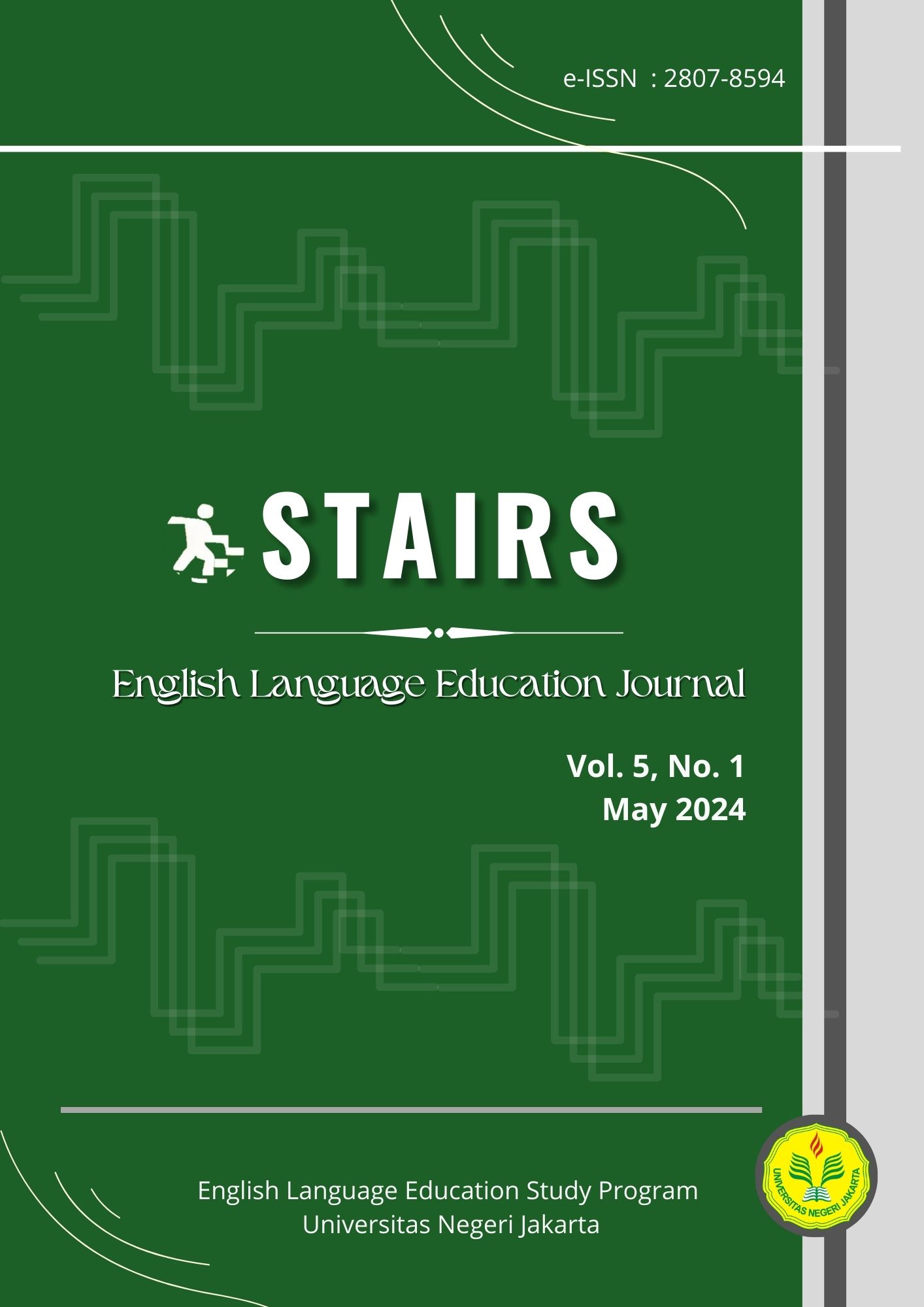Vocational High School Teachers’ Perception of Project-based Learning Method in English Language Teaching: A Case Study
DOI:
https://doi.org/10.21009/stairs.5.1.7Keywords:
Principle of PjBL, Project-based learning, Teacher’s perception, Teachers’ role in PjBL, Objective of PjBL, Vocational high schoolAbstract
As Vocational High School (VHS) students are prepared to work in certain fields, project-based learning (PjBL)becomes one of the teaching and learning methods that teachers can use to meet the expectations in the work field. Even though the effectiveness of PjBL implementation is related to how the teacher perceives the method, less attention is given to studies that focus on teachers' perceptions of the principles of PjBL. Therefore, this study aimed to investigate the English teachers' perception of the PjBL method in terms of the objectives, principles, and teachers' roles. The descriptive case study was employed as the research design to answer the formulated research questions. Semi-structured interviews with English teachers at SMKN 26 Jakarta were conducted to collect the data. The findings show that all teachers have a good perception of the objectives of the PjBL method. Most teachers fully understand their role in the PjBL method. However, there was some misunderstanding in teachers' perception of the principle of challenging problems/questions and public products. 75% of the teachers did not see sustained inquiry and reflection as the principle of the PjBL method. Therefore, teacher professional development training related to the principles of the PjBL method needs more attention.
References
Alsubaie, M. A. (2016). Curriculum Development: Teacher Involvement in Curriculum Development. Journal of Education and Practice, 7(9), 106-107, https://iiste.org/Journals/index.php/JEP/article/view/29628
Amalina, A., Lestari, Y. B., & Yusra, K. (2023). Teachers’ Perception Towards Project-Based Learning in Teaching English to Young Learners: A Case in Mandalika Intercultural School. International Journal of Multicultural and Multireligious Understanding, 10, 101–107. http://dx.doi.org/10.18415/ijmmu.v10i7.4783
Baysura, O. D., Altun, S., & Yucel-Toy, B. (2016). Perceptions of Teacher Candidates regarding Project-Based Learning. Eurasian Journal of Educational Research, 62, 15–36. https://doi.org/10.14689/ejer.2016.62.3
Bonner, S. M. (2016). Teachers’ perceptions about assessment. In G. T. Lh. L. R. Brown (Ed.), Handbook of Human and Social Conditions in Assessment (pp. 21–39). Routledge. https://doi.org/10.4324/9781315749136-8
Chiang, C. L., & Lee, H. (2016). The Effect of Project-Based Learning on Learning Motivation and Problem-Solving Ability of Vocational High School Students. International Journal of Information and Education Technology, 6(9), 709– 712. https://doi.org/10.7763/IJIET.2016.V6.779
Cintang, N., Setyowati, D. L, & Handayani, S. D. (2017). Perception of Primary School Teachers towards the Implementation of Project Based Learning. JPE, 6(2). https://doi.org/10.15294/jpe.v6i2.17552
Habók, A., & Nagy, J. (2016). In-service teachers’ perceptions of project-based learning. SpringerPlus, 5(1), 1–14. https://doi.org/10.1186/s40064-016-1725-4
Hamidah, H., Rabbani, T. A. S., Fauziah, S., Puspita, R. A., Gasalba, R. A., & Nirwansyah. (2020). HOTS-Oriented Module: Project-Based Learning (1st ed.). SEAMEO QITEP in Language.
Hasanah, E., Al Badar, M. I., Al Ghazy, M. I., & Fauzia, F. (2023). Enhancing Student Leadership Skills through Project-Based Learning in the Postgraduate Research Experience. The Qualitative Report. https://doi.org/10.46743/2160- 3715/2023.5848
Holm, M. (2011). Project-based Instruction: A Review of the Literature on Effectiveness in Prekindergarten through 12th Grade Classrooms. InSight: Rivier Academic Journal, 7(1), 1–13. https://www2.rivier.edu/journal/roaj- fall-2011/j575project-based-instruction-holm.pdf
Kavlu, A. (2017). Implementation of Project Based Learning (PBL) in EFL (English as a Foreign Language) Classrooms in Fezalar Educational Institutions (Iraq). International Journal of Social Sciences & Educational Studies, 4(2), 67–79. https://doi.org/10.23918/ijsses.v4i2sip67
Larmer, J., Mergendoller, J., & Boss, S. (2015). Project-based learning a proven approach to rigorous classroom instruction: Setting the Standard for Project Based Learning. Buck Institute for Education. www.ascd.org/memberbooks
Levine, G. S. (2004). Global Simulation: A Student-Centered, Task-Based Format for Intermediate Foreign Language Courses. Foreign Language Annals, 37(1), 26–36. https://doi.org/10.1111/j.1944-9720.2004.tb02170.x
Morrison, J., Frost, J., Gotch, C., McDuffie, A. R., Austin, B., & French, B. (2021). Teachers’ Role in Students’ Learning at a Project-Based STEM High School: Implications for Teacher Education. International Journal of Science and Mathematics Education, 19(6), 1103–1123. https://doi.org/10.1007/s10763-020-10108-3
Sari, R. A., Musthafa, B., & Yusuf, F. N. (2021). Persepsi Guru terhadap Pembelajaran Berbasis Proyek di Sekolah Menengah Kejuruan. Jurnal Penelitian Pendidikan, 21(2), 1–11. https://doi.org/10.17509/jpp.v21i2.36972
Sartika, U. D., Syafryadin, S., & Azwandi, A. (2022). English Teachers’ Perception of Implementing Project-Based Learning in Secondary Schools. ENGLISH FRANCA: Academic Journal of English Language and Education, 6(2), 477. https://doi.org/10.29240/ef.v6i2.5452
Scott, C. L. (2015). The Futures of Learning 2: What Kind of Learning for the 21st Century? UNESCO Education Research and Foresight, 1-14
Thuan, P. D. (2018). Project-based Learning: From theory to EFL classroom practice. The 6th International OpenTESOL Conference, 327–339.
Yin, R. K. (2018). Case Study Research and Applications: design and methods (6th ed.). SAGE Publications.



